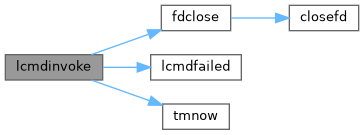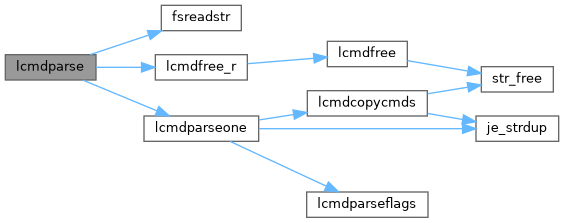File-specific system command execution mapping implementation. More...
#include "lcmd.h"#include <assert.h>#include <errno.h>#include <regex.h>#include <stdatomic.h>#include <stdbool.h>#include <stdio.h>#include <stdlib.h>#include <string.h>#include <sys/wait.h>#include <sysexits.h>#include <unistd.h>#include "cJSON/cJSON.h"#include "jemalloc/jemalloc.h"#include "fd.h"#include "je.h"#include "log.h"#include "tm.h"
Functions | |
| static void | str_free (str_set_inner_item *str) |
| Frees a dynamically allocated string. | |
| static void | reg_free (struct reg_t *reg) |
| Frees a compiled regex pattern if it was successfully compiled. | |
| static void | lcmdfree (struct lcmdset_s *cmd) |
| Frees the memory allocated for a single command set entry struct. | |
| void | lcmdfree_r (lcmdset_set *cs) |
| Iterates and frees all memory allocated by the command set array. | |
| static char * | fsreadstr (const char *fp) |
Reads the contents of the file described by filepath fp into a dynamically allocated buffer returned by the function. | |
| static str_set * | lcmdcopycmds (const cJSON *arr) |
| Duplicates a cJSON array of strings into a str_set. Non-string entries will print an error message and cause the entry to be NULL. | |
| static int | lcmdparseflags (const cJSON *item) |
Parses a cJSON array of strings into a set of file event bit flags. Non-string entries are ignored. Unrecognized string entries will log an error message. Accepted strings are "new", "mod", and "del" which map to LCTRIG_NEW, LCTRIG_MOD, and LCTRIG_DEL respectively. | |
| static int | lcmdparseone (const cJSON *obj, struct lcmdset_s *cmd, const int id) |
| Populates a single command struct by parsing the fields of the provided cJSON object. | |
| lcmdset_set * | lcmdparse (const char *fp) |
| Parses the provided file path and populates an array of command sets. The file must be a valid JSON file containing an array of objects. Each object must contain the following keys: | |
| static bool | lcmdmatch (regex_set *fpatterns, const char *fp) |
| Checks if the provided filepath matches any of the compiled regex patterns in the provided array. | |
| bool | lcmdmatchany (lcmdset_set *cs, const char *fp) |
| Checks if the provided file path matches any of the file patterns in the command set. | |
| static int | lcmdfailed (const char *src, const int st) |
Checks if the waitpid(2)-style int described by the wait status st failed due to an exit code or signal termination. If so, an appropriate log message is printed using the source description src. | |
| static int | lcmdinvoke (const char *cmd, const char *fp, struct fdset_s fds, const int flags, _Atomic uint64_t *msspent) |
Invokes a string cmd as a system command using system(3) in a forked/child process. The file path of node is set as an environment variable for use in the command. File descriptor set fds is used to optionally redirect stdout and stderr of the child command processes. | |
| int | lcmdexec (lcmdset_set *cs, const char *fp, const struct fdset_s fds, int flags) |
| Sequentially iterates the command set and executes the configured system commands on the provided file node if the trigger flags and file patterns match. | |
Detailed Description
File-specific system command execution mapping implementation.
Function Documentation
◆ fsreadstr()
|
static |
Reads the contents of the file described by filepath fp into a dynamically allocated buffer returned by the function.
- Parameters
-
fp The filepath to read
- Returns
- If successful, a pointer to a dynamically allocated buffer of the file's null terminated contents. The caller is responsible for freeing the buffer.

◆ lcmdcopycmds()
|
static |
Duplicates a cJSON array of strings into a str_set. Non-string entries will print an error message and cause the entry to be NULL.
- Parameters
-
arr cJSON array of strings
- Returns
- NULL if a string could not be duplicated, or the set could not be allocated. Otherwise, a str_set is returned containing the duplicated strings.


◆ lcmdexec()
| int lcmdexec | ( | lcmdset_set * | cs, |
| const char * | fp, | ||
| struct fdset_s | fds, | ||
| int | flags | ||
| ) |
Sequentially iterates the command set and executes the configured system commands on the provided file node if the trigger flags and file patterns match.
- Parameters
-
cs The command set array to filter and execute fp The file path to match against the command set fds The file descriptor set to use for stdout/stderr redirection flags The trigger flags to match, see LCTRIG_*. IfLCTOPT_VERBOSEis set, the commands will be printed to stdout before execution. IfLCTOPT_TRACEis set, the true/false match result for each command set will be printed to stdout.
- Returns
- 0 if successful, otherwise the first non-zero return value from
system(3)is returned.


◆ lcmdfailed()
|
static |
Checks if the waitpid(2)-style int described by the wait status st failed due to an exit code or signal termination. If so, an appropriate log message is printed using the source description src.
- Parameters
-
src The source description of the child process st The wait status of the child process
- Returns
- 1 if the value exited or was signaled, otherwise 0.

◆ lcmdfree()
|
static |
Frees the memory allocated for a single command set entry struct.
- Parameters
-
cmd Command set entry to free


◆ lcmdfree_r()
| void lcmdfree_r | ( | lcmdset_set * | cs | ) |
Iterates and frees all memory allocated by the command set array.
- Parameters
-
cs The command set array to free


◆ lcmdinvoke()
|
static |
Invokes a string cmd as a system command using system(3) in a forked/child process. The file path of node is set as an environment variable for use in the command. File descriptor set fds is used to optionally redirect stdout and stderr of the child command processes.
- Parameters
-
cmd The command string to execute fp The file path to assign to the FILEPATH environment variable fds The file descriptor set to use for stdout/stderr redirection flags Bit flags for controlling command execution. If the LCTOPT_VERBOSEflag is set, the command will be printed to stdout before execution. If theLCTOPT_TRACEflag is set, debug information regarding the eligibility of any encountered file path will be printed to stdout.msspent Optional pointer to a uint64_t value to which the time spent executing the command (in milliseconds) will be added.
- Returns
- 0 if successful, otherwise -1 to indicate an error.


◆ lcmdmatch()
|
static |
Checks if the provided filepath matches any of the compiled regex patterns in the provided array.
- Parameters
-
fpatterns Array of compiled regex patterns fp Filepath to match
- Returns
- True if the filepath matches any of the patterns, otherwise false.

◆ lcmdmatchany()
| bool lcmdmatchany | ( | lcmdset_set * | cs, |
| const char * | fp | ||
| ) |
Checks if the provided file path matches any of the file patterns in the command set.
- Parameters
-
cs The command set array to filter fp The file path to match
- Returns
- true if the file path matches any file pattern, otherwise false


◆ lcmdparse()
| lcmdset_set * lcmdparse | ( | const char * | fp | ) |
Parses the provided file path and populates an array of command sets. The file must be a valid JSON file containing an array of objects. Each object must contain the following keys:
on: An array of trigger flags to matchpatterns: An array of file patterns to matchcommands: An array of system commands to execute Theonarray must contain one or more of the following strings:new: Trigger on new filesmod: Trigger on modified filesdel: Trigger on deleted files Thepatternsarray must contain one or more strings that are used to match the file path. Thecommandsarray must contain one or more strings that are passed tosystem(3)for execution.- Parameters
-
fp The file path to parse
- Returns
- An array of command sets if successful, otherwise NULL.


◆ lcmdparseflags()
|
static |
Parses a cJSON array of strings into a set of file event bit flags. Non-string entries are ignored. Unrecognized string entries will log an error message. Accepted strings are "new", "mod", and "del" which map to LCTRIG_NEW, LCTRIG_MOD, and LCTRIG_DEL respectively.
- Parameters
-
item cJSON array of strings
- Returns
- Bit flags representing the file event types, or 0 if no flags were correctly parsed.

◆ lcmdparseone()
|
static |
Populates a single command struct by parsing the fields of the provided cJSON object.
- Parameters
-
obj cJSON object containing the command data cmd Struct to populate with parsed command data id Command set index for naming purposes
- Returns
- 0 if successful, otherwise non-zero to indicate an error.


◆ reg_free()
|
static |
Frees a compiled regex pattern if it was successfully compiled.
- Parameters
-
reg Pointer to the regex pattern struct to free

◆ str_free()
|
static |
Frees a dynamically allocated string.
- Parameters
-
str Pointer to the string to free
- Note
- This function is intended for use with str_set_for_each, which requires a function that takes a pointer to the inner item type.
